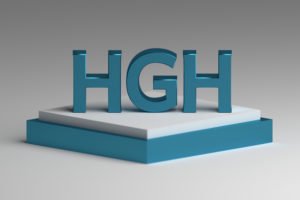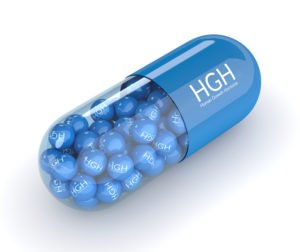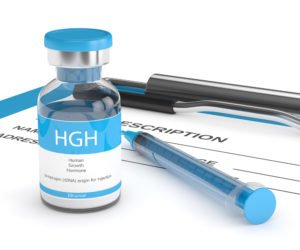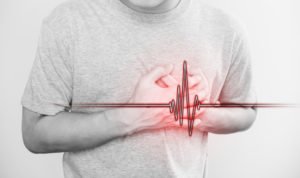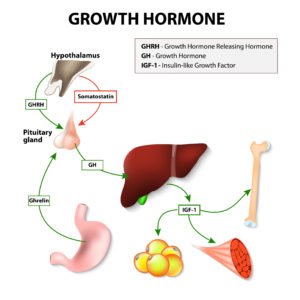
People considering HGH therapy often want to know what happens if you stop taking growth hormone. As with anything else, reactions can vary widely from one person to another. Other factors that can impact one’s experience upon terminating treatment include:
- The person’s dosage of HGH,
- How long the individual was on human growth hormone therapy, and
- How severe the person’s growth hormone deficiency is without treatment.
Generally, people begin to feel the way they did before they started growth hormone therapy. Some people begin to feel that way sooner than others.
How Stopping HGH Therapy Can Affect the Body
Let’s say that a person started growth hormone therapy because he felt tired all the time and no longer had the stamina to exercise enough to stay healthy and fit. A doctor examined him, took his medical history, ran diagnostic tests, and found that he had growth hormone deficiency.
The physician prescribed injectable HGH to treat this medical condition. The patient experienced increased levels of energy and was able to return to an active lifestyle. His state of mind improved along with his physical health. If this patient discontinues growth hormone therapy, over time, he could become fatigued and weak again. His fitness and enjoyment of life can deteriorate.
Left untreated, the patient’s growth hormone deficiency could worsen. He could develop symptoms he did not have before he sought medical help. These are a few examples of what can happen if you stop taking growth hormone. An individual’s experience could be similar to or different from these things.
For a free consultation, call (305) 682-1818
Who Is at Risk of HGH Withdrawal
A person who was thinking about stopping growth hormone therapy might wonder if doing so could cause HGH withdrawal. Human growth hormone is a substance the body makes in the pituitary gland. A patient who receives HGH treatment for a growth hormone deficiency through a qualified medical professional is unlikely to experience withdrawal symptoms when he stops taking HGH.
Doctors determine the appropriate dosage for a patient to achieve normal levels of the hormone in the bloodstream. As such, it is not likely that the patient’s body got used to an excessive level of HGH.
When people take extremely high doses of growth hormone for reasons other than a clinical deficiency—such as to gain an unfair advantage in athletic competition—these individuals risk the possibility of withdrawal when they stop taking the substance. The only legal way to obtain HGH in the United States is through a prescription for the injectable form of the growth hormone.
People who get HGH through illegal means might not use the dose they expect and could receive far more (or less) of the substance then they intended. Unregulated HGH products might not even contain any growth hormone at all. Many HGH products are not even regulated by the (food and drug administration) FDA.
Symptoms of Low Human Growth Hormone Levels
Almost everyone experiences diminishing levels of HGH as they get older. Still, if the body is making enough of this substance to function well, there is no need for supplementation.
For some people, the signs develop gradually over quite a few years. Others can notice a difference in less time. People whose HGH levels have fallen to the point of a diagnosable growth hormone deficiency can have symptoms like these, according to the National Organization for Rare Disorders (NORD):
- Insufficient stamina to exercise as one did in the past
- Carrying extra weight around the midsection of the body
- Depression and anxiety
- Fatigue, exhaustion, and lack of energy
Some people also experience things like high blood pressure, unhealthy cardiac enzyme levels, insulin resistance, and metabolic syndrome with these symptoms. Loss of bone density and muscle mass are also common with growth hormone deficiency.
Insufficient levels of growth hormone can lead to impaired cognitive function, particularly regarding memory, processing speed, and attention. Numerous kinds of tissue throughout the body need sufficient levels of HGH to perform correctly.
Click to contact our specialist today
The Benefits of HGH Therapy for People with Growth Hormone Deficiency
The symptoms of growth hormone deficiency can sound alarming, but according to Harvard Men’s Health Watch, successful treatment can improve a person’s condition. Response to the therapy can vary from one person to another, but many people respond well to HGH injections for growth hormone deficiency.
Patients can experience an increase in muscle mass, bone density, energy levels, and stamina. Physical activity can become easier, and workouts can start to give the results that they did in the past. A person’s risk of developing cardiac disease in the future can decrease with growth hormone deficiency treatment, as well.
Complete a Free Consultation form now
How to Get Started with HGH Therapy
At HealthGAINS, we want our patients to achieve optimal health and wellness. We perform comprehensive medical evaluations to determine if an individual has a clinical need for bioidentical growth hormone treatment. We have medical professionals supervise all HGH therapy. Each client receives an individual treatment plan based on their unique needs.
You can call us today at (305) 682-1818 and speak with one of our wellness advisors at no cost. There is no obligation.
Call or text (305) 682-1818 or complete a Free Consultation Form
